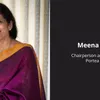Blockchain to AI, YourStory's Health 360 summit breaks down the role of technology in healthcare
YourStory’s Health 360 brought together leaders, policymakers, entrepreneurs, and healthtech experts to delve deep into the smart trends defining new-age healthcare in India.
From artificial intelligence and machine learning solutions to bio-markers, urban health initiatives, and health accessibility, YourStory’s Health 360 summit delved deep into smart trends defining new-age healthcare in India.
The summit brought together leaders, policymakers, entrepreneurs, and healthtech enthusiasts from India's healthcare industry, including Ajeya Motaganahalli (MD at India R&D Pure Storage), Ankur Gigras (Founder and CEO at HeaxHealth), Arvind Chari (Principal at Eight Road Ventures), Gunjan Bhardwaj (Co-founder and CEO at Partex NV), Hareesha Prabhu (Strategy and Transformation Leader at Philips Innovation Campus), and Nitin Gupta (India Head at Suki).
Amid the pandemic, healthcare delivery in India witnessed a renewed focus on leveraging technology. In the post-COVID-19 world, technology would transform the Indian healthcare ecosystem, and hospitals are already leading the way.
Ankur, whose startup HeaxHealth offers access to surgery technologies and doctors at India’s best hospitals, said that the hospitalisation process is tough — from figuring out the right hospital to getting post-op care.
Earlier, hospitals invested little to no money or had the desire to leverage technology. But their attitude towards adopting tech is changing now. He added, "We fundamentally believe that other than surgery, most parts of the process can be managed by technology.”
At present, the Indian healthcare industry is seeing many innovative solutions and digital platforms emerge, and the cloud computing industry is at the forefront of revolutionising it.
“The modern world reacted to the pandemic, not just with edge tools and traditional ways. It mounted a fierce counter-attack using data, and some of it was possible when we were connected to a large data lake somewhere through the cloud, running on an extremely fast and efficient system and providing analytics and real-time intelligence to tackle something like that,” Ajeya from R&D Pure Storage, said.
He added, “That's how we will tackle new pandemics or challenges.”
Besides, using the cloud provides an opportunity for the healthcare environment to improve patients' services and make collaboration between doctors and patients easier.
“From a care receiver side, the significant advantage the technological transformation like this [cloud] brings to the table is affordability and access — when I need, where I need,” Hareesha from Philips Innovation Campus, said.
Highlighting the challenges in the healthcare industry, Nitin, India Head at Suki, said that accessibility, especially in remote areas, quality of care, and high cost pose the biggest challenges for a vast country like India.
He explained, “Digital transformation and digitisation will continue to see major traction in the healthcare domain. Healthcare organisations will continue to adopt technology solutions, implemented through AI and ML techniques, and would help them solve these challenges.”
Blockchain, too, can contribute to the transformation of the healthcare sector. According to Gunjan, Co-founder and CEO at Partex NV, blockchain is the single most transformable technology available to all of us, and its true power lies in decentralisation.
“Imagine a paradigm, where a patient uploads his or her data, summarised, and extracted. A big pharma or biotech can avail that data directly on a decentralised data exchange and pay something of value to patients directly,” Gunjan said.
“That means data is the new oil, patients have that oil, and they control that oil. If you can bring them directly on a decentralised exchange, you can change the affordability paradigm of healthcare,” he explained.
Arvind, Principal at Eight Road Ventures, said that the tech-savviness of the doctor and the broader healthcare provider communities have gone up quite a bit, easing several entry barriers for many businesses.
“The entrepreneur community we are interacting with today is very different from one we used to, maybe three years ago. There is a lot of disruption coming from entrepreneurs who are branching out of high-quality startups; who now want to get into healthcare because it is a hot sector, and while it leads to a little bit of clutter, it also leads to a lot of innovation,” he shared.
Edited by Suman Singh









